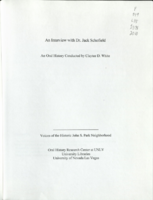Search the Special Collections and Archives Portal
Search Results

Transcript of interview with Dr. Jack Lund Schofield by Suzanne Becker, January 13, 2009
Date
Archival Collection
Description
In the dusty border town of Douglas, Arizona, Dr. Jack Lund Schofield was born in the family home in 1923. Due to the economic woes of the Great Depression, the Schofield family moved several times until 1937—the year that Jack's father took a position as a tungsten broker and moved his family of five children to Nevada. For Jack, who was ready to start high school, the move from Phoenix to Las Vegas with a small population of 5000 was a shock. However, it did not take the gregarious Jack long to make friends at Las Vegas High School. He played sports and was a Golden Glove boxing champion. As Jack's high school years drew to an end, two major events occurred: he met his future wife and World War II began. He proudly highlights his service as a fighter pilot in both WWII and the Korea conflict, his family genealogy, and his devotion to being an excellent educator, businessman, family man, and politician. In 1995, he earned his doctorate in education at the age of 72. His resume includes being an elected official, serving on the Board of Regents and having a middle school named after him. Jack and his wife, Alene, have resided in the John S. Park Neighborhood for over 50 years and describes his affection for the neighborhood and some of the changes that have occurred.
Text

Interview with Charles McWilliam, January 11, 2005
Date
Archival Collection
Description
Text

Interview with Michael Bordner, June 8, 2005
Date
Archival Collection
Description
Text

Interview with William Marvin Swena, October 29, 2004
Date
Archival Collection
Description
Text
Steve Sisolak (Nevada Governor) oral history interview conducted by Magdalena Martinez: transcript
Date
Archival Collection
Description
From the Lincy Institute "Perspectives from the COVID-19 Pandemic" Oral History Project (MS-01178) -- Elected official interviews file.
Text
Sandstone Ranch Collection
Identifier
Abstract
The Sandstone Ranch Collection is comprised of bank statements, letters, correspondence, and photographs relating to the Wilson family from 1907 to 1941. The collection includes information about the financial aspect of the Wilson Ranch, later renamed the Sandstone Ranch, located outside of Las Vegas, Nevada. The collection also includes information about the personal lives of those working on the including contracts about grazing cattle, selling cattle, and appropriation of water.
Archival Collection
UNLV Libraries Collection on the Las Vegas Paiute Tribe
Identifier
Abstract
The UNLV Libraries Collection on the Las Vegas Paiute Tribe (approximately 1974-1990) contain oral history transcripts of Paiute community members from approximately 1974 to 1977 and reproductions of Bureau of Indian Affairs correspondence, legal documents, annual reports, and census information regarding the area formerly known as the Las Vegas Indian Colony located in Las Vegas, Nevada. The documents contain information about the original transfer of property ownership from Helen J. Stewart to the United States, who acted on behalf of the Paiute people in 1911, the establishment of the original site location, and annual reports which include a narrative about the community, census information, and health reports of the population living in the area. The collection contains no original documents.
Archival Collection
Claudine Williams Papers
Identifier
Abstract
The Claudine Williams Papers (1956-2009) contain awards, contracts, personal and business correspondence, newspaper clippings, and photographs pertaining to Las Vegas, Nevada businesswoman and philanthropist, Claudine Williams. The collection also includes extensive information on her hotel and gaming properties, including the Silver Slipper Gambling Hall, Holiday Casino, and Harrah's Hotel and Casino, as well as her honorary doctoral degree, medals, and audiovisual materials of interviews, news reports, and events.
Archival Collection

Danny Cluff oral history interview: transcript
Date
Archival Collection
Description
Oral history interview with Danny Cluff conducted by Claytee D. White on December 8, 2017 for the Remembering 1 October Oral History Project. In this interview, Danny Cluff discusses his attendance at the Route 91 Harvest music festival on the evening of the October 1, 2017 mass shooting in Las Vegas, Nevada with his friends and nephew. He talks of finding safety in Hooters with other survivors from the concert. When speaking of gun control, he discusses his perspectives on human nature, citing his experiences during and after the concert shooting. Throughout the interview, Cluff speaks of the ways he has healed and kept positive after the shooting, such as laughing through the hard times and writing poetry, of which he gives a few samples.
Text

